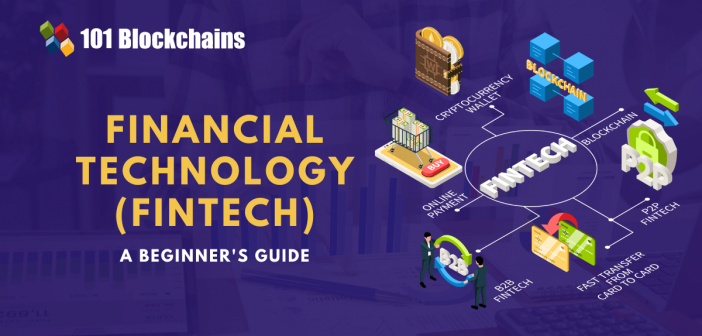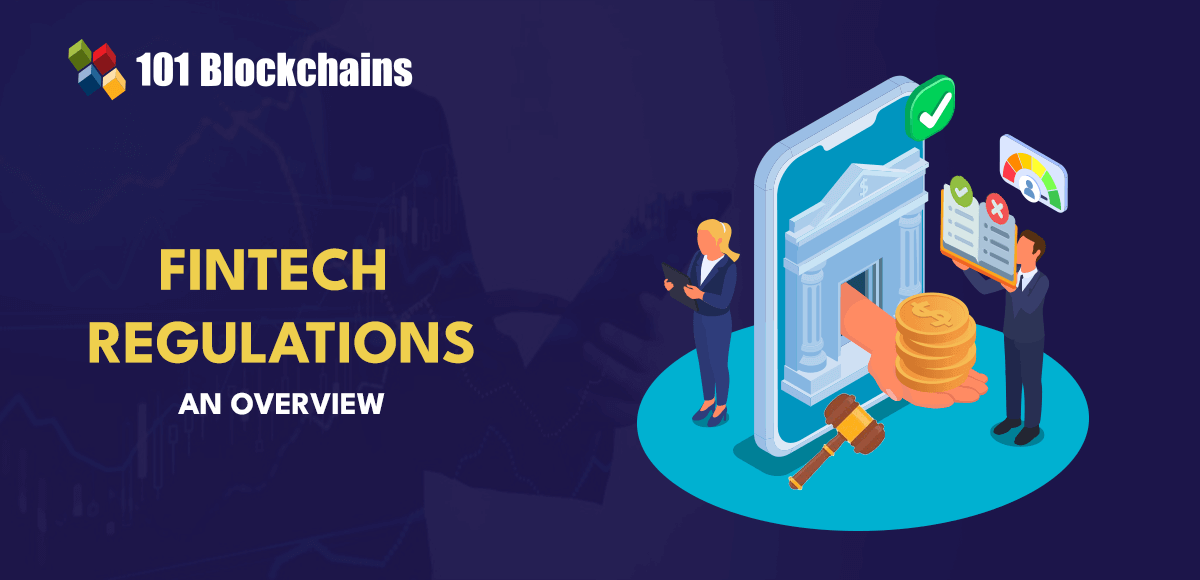The domain of fintech has successfully accumulated more than $13 billion within the first quarter of 2022. In basic terms, you can delineate financial technology or fintech as the combination of two terms, “finance” and “technology”. Technology has played a crucial role in transforming how we access and manage financial services. Some notable examples of finance technology include online banking, digital loans, digital currencies, and e-commerce payments. Speaking of digital currencies, you must also take note of cryptocurrencies and their role in fintech. Cryptocurrencies have spelled the beginning of blockchain and the web3 revolution. How do all these elements of financial technology play out for the benefit of users? The following post attempts to offer an answer by reflecting on what is fintech and how it works. You can also learn about top examples and trends in the domain of fintech for the future. At the same time, the discussion also emphasizes important skills you need to learn and build your career in fintech.
Excited to explore the impact of technology on financial services? Enroll Now in the Certified Fintech Expert (CFTE)™ Certification Course Now!
Definition of Fintech
The foremost detail in any description of fintech explained for beginners would focus on the definition of fintech. It denotes the use of technology to support financial service organizations and consumers in efficiently managing financial processes. The “technology” part of fintech focuses on algorithms and software users can access on their devices. In addition, technology also involves new tools and innovative approaches for automation and enhancing the experience of financial services.
The fintech explanation may also create queries regarding the ease of adopting the new concept. Many would assume that fintech is a modern tech concept, understandable only for a few. However, you can identify fintech as the use of technology for modernizing banking, transactions, and various financial services. The evolution of fintech probably started from digital financial transactions, online trading, and phone banking. Financial institutions and consumers experienced new and efficient transaction models. Subsequently, the value improvements introduced by technology in financial services encouraged the introduction of cloud computing, artificial intelligence, data analytics, and cyber security.
What are the basic fintech examples you could find in your everyday lives? Do you use a mobile payment app, like PayPal or Venmo? If yes, you have used fintech, probably many times, for sending/receiving payments or checking your account balance. Other notable examples of fintech are trading platforms, cryptocurrencies, and automated portfolio managers. As of now, fintech has become one of the integral elements for the future of financial services.
Learn the basic and advanced concept of Fintech. Enroll Now in Fintech Fundamentals Course!
Origins of Fintech
The history of fintech can serve as the ideal complement for understanding “what is fintech” and the examples in detail. Fintech might appear as the outcome of multiple consecutive technological breakthroughs. However, the early examples of credit cards, introduced in the 1950s, are probably the best explanation for the origins of fintech. Credit cards removed the need for carrying physical currency, and subsequently, many improvements ensued.
The first fintech company operating on the internet was PayPal, founded in 1998 and setting a milestone that would resonate for years in the future of the financial services industry. The various examples of integrating financial services with mobile technology, data encryption, and social media established the ideal grounds for the growth of fintech. With the arrival of blockchain, fintech would become more powerful with decentralized access to financial services and user involvement in the management of their assets.
Learn more about the role of Blockchain in Finance with our FREE presentation on Blockchain in Finance
Working of Financial Technology
The overview of fintech’s meaning and its origins offered a basic impression of its goals. It is clearly evident that fintech has imposed a significant influence on the financial services industry. The simple explanation for the working of fintech suggests the use of technology. Therefore, the ideal question to ask would be, “What are the technologies that work in fintech?” to understand how fintech works. Here are some important technologies which are the core elements in the existing fintech ecosystem.
-
Biometric Sensors and Smart Chips
Biometric sensors for accessing financial services, such as integration of ATMs with mobile applications, eye recognition, and palm recognition for identifying the account’s owner. Smart chip ATM cards are another common example of fintech applications, which have helped in reducing the financial loss occurring in the event of untoward circumstances. The technology relies on a one-time password for transactions, thereby showcasing an example of two-factor authentication in securing consumer funds.
-
Digital and Omnichannel Banking
The next important technology powering the fintech industry is digital and omnichannel banking. Fintech has been responsible for the transformation of the complete banking system with a branch-centric process into multiple digital channels. People don’t have to visit banks anymore for accessing basic financial services, with the availability of mobile banking. Different banks have been capable of reducing the number of branches to reduce operational costs.
-
Chatbots
Chatbots are software-enabled digital assistants for communicating with customers and resolving common problems of customers. In addition, chatbots could also help in offering many other services, such as investment advice and discovering relevant information on the official websites of banks. Chatbots are the simplest example of fintech explained here, albeit with a dominant impact on the financial services industry. Banks have been able to adopt chatbots for the reduction of costs alongside enhancing customer satisfaction, thereby enabling the use of human resources in core business activities.
Join Standard/Premium Plan now to watch our on-demand webinar on Bridging Traditional Finance With DeFi
-
Artificial Intelligence
The most formidable technological advancement, which is likely to have a dominant impact on financial services, is artificial intelligence. AI and machine learning have offered promising results in the detection of fraud. Subsequently, fraud detection could help in generating alerts in the event of identifying fraudulent transactions. Subsequently, machine learning can help in powering up statistical modeling, process automation, and data aggregation platforms. It also works for the transformation of anti-money laundering methods with new developments such as data aggregation platforms and effective insights into historical data.
-
Cryptocurrencies, Electronic Wallets, and DeFi
The next big thing for the fintech industry would refer to empowering users. Cryptocurrencies have offered a clear example of transforming financial services with blockchain technology and improving security and flexibility. Subsequently, the rise of smart contracts and decentralized applications paved the path for establishing DeFi. Decentralized finance can be considered the big frontier for fintech as it would provide power to the hands of users. At the same time, cryptocurrencies have also led to the development of many other associated solutions, such as crypto wallets and exchanges.
Want to learn and understand the scope and purpose of DeFi? Enroll Now in Introduction to DeFi- Decentralized Finance Course
Existing State of the Fintech Industry
The detailed insights on technologies powering the fintech landscape show that it has promising potential. However, it is important to understand how fintech is performing right now before you decide to pursue it. Most people showed interest in learning fintech in the midst of the global pandemic in 2020. The financial services industry requires the use of technology to reduce human interaction, enhance consumer comfort, and help businesses adapt to unprecedented circumstances. McKinsey Digital has reported that the world has moved almost five years ahead in the adoption of digital technologies in finance by institutions and consumers. Online financial transactions have turned from an element of convenience to a necessity.
The importance of fintech, meaning a lot for financial services, is evident in the fact that customer behaviors have also adapted to changing models of access to financial services. Historical data about the global fintech market shows that the industry stood at almost $127 billion in 2018. Now, estimates imply that the fintech market may reach over $300 billion in 2022. The predictions about the fintech industry suggest that it has the potential to change how we perceive and access financial services.
Develop in-depth knowledge of fintech concepts and become a part of the advancements in finance with elementary Fintech Flashcards.
Impact of Financial Technology
Another crucial aspect for understanding fintech would focus on its advantages. How has it transformed financial services? The fintech examples and technologies offer a precise outline of how fintech could benefit businesses and users. Fintech is capable of thriving in an era of disruption, and it is important to wonder whether it can continue ahead in future. Here are the notable advantages of fintech, which showcase its impact.
Fintech is ‘disruptive’, and it is quite important to emphasize this factor, as it would play a vital role in encouraging new ideas. The introduction of innovative, adaptive and scalable technologies across different industries for enabling efficient and productive transactions has become easier.
Fintech is capable of offering faster, more transparent and more convenient modern-day solutions. Big data and artificial intelligence could offer a higher degree of personalization for consumers. In addition, financial service institutions could achieve improvements in marketing practices.
The need to learn fintech could become more essential as it can offer faster, more transparent, and more convenient modern-day solutions. Chatbots could save almost $7.3 billion for banks all over the world. The performance of chatbots in numbers proves their worth as a fintech instrument. At the same time, loans, insurance, crowd-sourcing, and digital payments have become accessible to almost everyone.
Another dominant highlight in the domain of fintech refers to the possibility of improvements in cybersecurity. Fintech could ensure better safety alongside compliance in financial data management, as compared to legacy systems. It also provides an effective opportunity for benefits to the global economy with new job prospects. However, the market is tough to navigate for a beginner. How would you find your way to a career in fintech?
What Are the Job Roles Available in Fintech?
The different fintech types in multiple examples and their impact offer clarity regarding their capabilities to encourage job prospects. One of the doubts of beginners about pursuing a career in the blockchain would refer to the job roles available in the industry. It has immense scope for data scientists, blockchain developers, communication experts, risk compliance and information security professionals, and operations managers. With the growth of fintech, you can expect multiple opportunities in roles that are not related to technology, although important to the objectives of fintech in the organization.
Become a certified blockchain expert with 101Blockchains’ Blockchain Certifications designed to propel your career in blockchain technology.
Key Skills Required for a Career in Fintech
The lucrative fintech ecosystem also fuels curiosity regarding the skills you need to learn fintech and become an expert. Here is an outline of the notable areas of knowledge you must cover before exploring any career opportunities in fintech.
-
Programming
Most of the fintech solutions are mobile applications or web-based solutions, focused on a broader reach and enhanced consumer value. Software developers and programmers could take on the primary responsibility for the development and maintenance of fintech sites and applications. It would ensure secure, navigable, and efficient operations of the fintech applications. Some of the notable programming languages you need to learn for a career in fintech are JavaScript, Python, and Solidity.
Want to get an in-depth understanding of Solidity concepts? Join Standard/Premium Plan and get free access to Solidity Fundamentals Course Now!
-
Cybersecurity
The emphasis of the detailed fintech explanation also revolves around the improvement of the security of financial assets. The majority of organizations using fintech technologies rely more on data and connect with large digital networks to enable seamless experiences and new prospects for users. As a fintech professional, you would have to bear the responsibility of securing the assets of users in any way possible.
-
AI/ML and Data Science
Data and AI along with machine learning would also revolutionize the financial services industry. You must understand how big data skills and knowledge of developing artificial intelligence and machine learning algorithms could help you for a career in fintech.
-
Blockchain
The most relevant addition to skills to become a financial technology or fintech expert would be blockchain technology. Aspiring fintech professionals should find learning materials for understanding how blockchain works behind cryptocurrencies, peer-to-peer transactions and DeFi. The increasing adoption of cryptocurrencies and DeFi solutions is a gleaming indicator of the necessity to learn blockchain for becoming a fintech professional.
Start learning Blockchain with World’s first Blockchain Career Paths with quality resources tailored by industry experts Now!
Bottom Line
The basic introduction to fintech for beginners offered a clear impression of different fundamentals. Fintech started with early credit cards and has come a long way to cryptocurrencies, smart chip ATMs, and easy access to financial services. The growth of the fintech industry at a staggering pace also creates concerns regarding the safety of financial technology. At this point in time, security concerns are an evident issue with almost every technology and financial technology has certain vulnerabilities. However, it would continue to expand further as user behaviors and organizational perspectives toward financial services change.
*Disclaimer: The article should not be taken as, and is not intended to provide any investment advice. Claims made in this article do not constitute investment advice and should not be taken as such. 101 Blockchains shall not be responsible for any loss sustained by any person who relies on this article. Do your own research!






